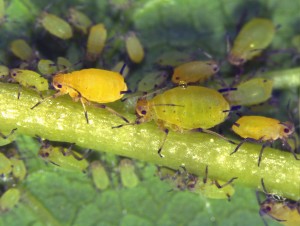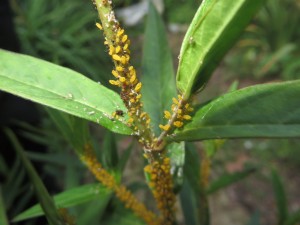Aphids are pests that feed on many kinds of garden plants. These tiny insects wreak massive destruction in multiple ways. There are many different kinds (and colors) of aphids. They’re small, 1/16 inch more or less, and feed on plant sap to obtain nutrients. In greenhouses they reproduce without mating; one aphid can start a new colony. Aphids can arrive with plant material, move from one crop to another, or from nearby garden weeds to favorite host plants.
Damage is caused in several ways. Large numbers can lead to reduced growth and vigor. As aphids develop, they deposit a sticky ‘honeydew’ substance on plants on which sooty molds grow – which can spoil the appearance and marketability. Feeding by some kinds causes severe plant distortion. Aphids can transmit disease viruses to healthy plants from sickly ones.
Aphids infest many greenhouse crops, garden vegetables and fruit plants, and landscape trees, shrubs and vines. Common favorites include roses, salvia, impatiens, pansy; vegetables such as pepper, cabbage and kale, tomato; tree fruits such as apple, peach and cherry; and cane fruits such as raspberries and blackberries. A complete list would run many pages long.
Their reproduction rates are incredibly fast and quickly get out of hand inside a home greenhouse where the environmental conditions are perfect. Numbers grow from a few to many thousands in a few weeks. Tiny aphids are often difficult to see and their body colors make them well-camouflaged. Numbers increase when environmental conditions are warm and moist, and plants are well-fertilized.
Don’t invite aphids into your greenhouse and garden. Inspect new plants before purchasing, particularly those bargain plants at flea markets or give-away by other gardeners. Aphid outbreaks can be managed with many effective biological agents and chemical pesticides.



 Posted in
Posted in 
